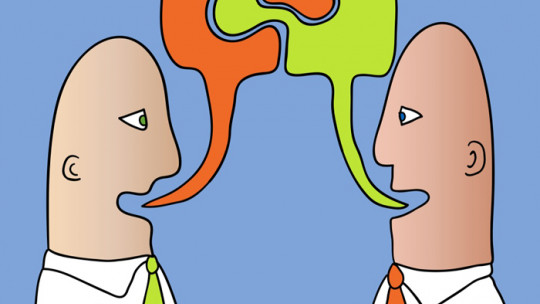Do we know what empathy really is? How can we be more empathetic? Discover the characteristics of empathetic people and how to develop this skill.

The empathy It is a skill that we are not born with, it is forged little by little in our life evolution when we introduce it and it requires effort and practice to master it, although there are people for whom it comes more naturally than others. Now, how can we work on it?
What is empathy? Meaning
The word empathy It is a technical concept that is increasingly used by society but many times people confuse sympathy with empathy or use them as synonyms when they are not.
We all know more or less what sympathy means, it is a feeling by which we find the other person pleasant and we want to be with them according to their way of being or behaving. However, empathy has nothing to do with that. Empathy is the ability of a person to put themselves in another person’s shoes, to value what the other person may feel or think, no matter how far away from oneself this person may be. That is to say, it is not about feeling the other’s feelings but about understanding how the other feels and making them feel understood.
Empathy is about the ability to understand what others feel, that is, putting yourself in the other’s perspective and imagining yourself in their place. A empathetic person He can understand, therefore, the emotions and feelings of those around him. Being empathetic is not a universal response, that is, each person has a different degree of empathy than others.
What does it mean to be empathetic? Signs of empathy
There are a series of signs that can help you see if you are really a empathetic person Among the most common characteristics, we can highlight the following:
- You listen to others: Be empathetic It involves knowing how to listen to what others say. In this way, empathetic people know how to listen and let others express their words.
- They tell you the problems: at sbe empathetic Many people usually come to you to tell you about their problems since you know how to listen.
- You understand how others feel: The empathic They can understand how people feel. Therefore, they capture the emotions and the meaning that you have.
- You think about how others will feel: The empathetic people They often have thoughts about how others will feel.
- You feel overwhelmed by catastrophes: When suffering from a catastrophe, a empathetic person You may feel overwhelmed by tragic events.
- You try to help: When someone is empathetic He usually tries to help people who are suffering or who require some support.
- You detect honesty: Someone empathic You can usually detect when a person is being honest or not.
- Few limits: To some empathetic people They find it difficult to establish limits in relationships with other people.
These are some of the characteristics of empathic people In addition, having a lot of empathy also makes you care about the well-being and happiness of others. However, it can also involve feeling overwhelmed in certain situations, as well as overstimulated from feeling too many emotions. In these cases, it is advisable to visit a professional psychologist.

Types of empathic people
There are different types of empathy different:
- Affective empathy: Be empathetic affectively involves understanding another person’s emotions and responding appropriately. This emotional understanding can lead us to worry about the well-being of other people.
- Somatic empathy: This type of empathy involves experiencing a physical reaction in response to what another person is experiencing. That is, empathic people of this type can physically experience what another person feels.
- Cognitive empathy: It involves being able to understand another person’s mental state and what they might be thinking in response to a specific situation.
How to be more empathetic?
If you wish be more empathetic there are a series of tips that you can follow to improve this skill:
- Listen carefully and actively to the other person: When someone tells you their concerns, it is common to feel identified and say phrases like: “well the same thing happened to me”, when often what that phrase seeks is for you to be able to talk about your experience and not theirs. It is important to listen to what they are telling you without talking about yourself and of course without cutting off the other person’s speech. Listening to what the other person tells you, respecting their time and being interested in knowing more makes the person feel understood.
- Ask to know more: When one does active listening, the most normal thing is that doubts arise about the topic. Don’t be shy and ask everything you want to know. This will make the person feel like they have the space to talk and feel that you care about them. Accompany this listening and questions with open verbal language. Sit in front of the person and look at their face, avoid crossing your arms and send listening messages such as paraphrasing what they say. For example: “You say that you haven’t spoken to your partner in days and that makes you feel very alone. I understand what you are telling me and how alone you must feel.”
- Avoid filler phrases like: “everything will be solved”, “don’t worry”, “nothing happens”, “don’t think anymore”, etc. Even if your intention is to calm the other person, what these phrases do is cut off the conversation of the person who is venting to you. Far from feeling understood, what the other person may think is that what he is saying is boring or that he has to change the subject. Phrases like: “It must be hard” or “I can’t imagine what you must be going through” are more accurate, as they help the person continue to vent.
- Try to think and feel as he or she does: This step is complicated since it requires putting yourself in their shoes. Don’t think about what you would do, what you would think or what you would feel. Think about your value system, how you have been educated, what you consider to be important, and from there speak from what you think it would be good for you to hear, the advice that you would benefit from receiving.
- Avoid typical advice: Phrases like “what you have to do is…” or “what happens to you is…” it is better to avoid them. Empathy doesn’t require you to solve people’s problems. Sometimes simply listening is the best help. That advice you give kindly can be perceived as a lack of understanding and almost like a lecture. Phrases like: “it’s very easy for you, you’re not living it” are likely to be heard in response to well-intentioned advice.
If you follow these guidelines little by little you will notice that your ability to be empathetic it is developing. You will see that conversations with others are deeper and you will feel that the conversation flows more.
“See with the eyes of the other, listen with the ears of the other and feel with the heart of the other.”
Alfred Adler








